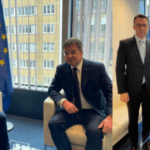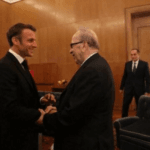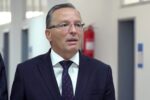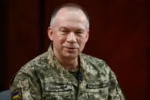In 2013, when Kosovo and Serbia reached the first agreement to normalize relations, expectations were that it would bring new life between the two hostile countries, address ethnic divisions in Kosovo and pave the way for greater international integration. of the state – then only 5 years old. The leaders of the negotiations were Hashim Thaçi, prime minister of Kosovo, and Ivica Dacic, prime minister of Serbia.
The one who sat them together at the table and managed to align their positions after six months of talks, was Catherine Ashton, then the head of the European Union’s foreign policy.
“The negotiations are over. The text [of the agreement] was signed by both prime ministers. I want to congratulate them for their determination during these months and for their courage,” Ashton said in April 2013.
The agreement was never fully implemented by either side, and they repeatedly blamed each other for failures.
Ashton was replaced in 2014 by Federica Mogherini, who mediated several rounds of negotiations between Kosovo and Serbia, but also witnessed new waves of tensions between them.
In 2019, the position of EU foreign policy chief was taken by Josep Borrell, under whose mandate Kosovo and Serbia also reached an agreement on the normalization of relations in 2023, but which, likewise, was not implemented.
Despite efforts last week, Borrell failed to get Kosovo Prime Minister Albin Kurti and Serbian President Aleksandar Vučić to sit down together at the table, due to, he said, some conditions put forward by Kurti, which Vučić did not accept.
For both countries, the normalization of relations is a condition for progressing on the path to EU membership. Currently, both of them are at a standstill: Kosovo has not received any response to the application for membership, made as early as the end of 2022, while Serbia, from 2021, has not opened any chapter of negotiations for admission.
Between them, from the fall, will be Kaja Kallas, who will be confirmed in the position of EU foreign policy chief for the next five years. Kallas, currently Prime Minister of Estonia, has spoken in favor of Kosovo’s European integration and has also emphasized the need to improve relations with Serbia, saying that a secure Western Balkans “is in the interest of all of Europe”.
For observers of the Kosovo-Serbia dialogue, Kallas should change the tactic of mediation between the two countries. The conditionality with only European integration has not worked, says Maja Pishqević, from the Atlantic Council, for the Expose program of Radio Europe e Lire.
“The powerful financial instrument would be one of the ways – i.e. stopping the financial support from the European Union, which is very important for all the countries of the Western Balkans. Although they complain that it is not enough, it would be very difficult for each of the countries if it were left without it”, says Pishqeviq.
The European Union plans to allocate a fund of 6 billion euros to the countries of the Western Balkans for the period 2024-2027, in order to accelerate their European integration.
During a visit to Pristina and Belgrade on June 18 and 19, the EU’s special envoy for the Kosovo-Serbia dialogue, Mirsollav Lajçak – who will also be replaced in the coming months – warned that Kosovo and Serbia must to demonstrate a constructive approach to dialogue, to have access to this fund.
Pishqević says that this must be implemented in practice, as soon as possible.
“Whoever replaces Lajçak, must have other instruments to direct the process. If he doesn’t have them, he will end up like Lajcak [without convincing the parties to implement the agreements]. I am not optimistic that anything will change, if only the names [of the mediators] change”, says Pishqević.
Considering the “fragile status quo” in Kosovo, Pishkevic adds that the EU should also coordinate with international partners, such as NATO, to support the dialogue process between Kosovo and Serbia.
NATO, with its peacekeeping mission KFOR, has been present in Kosovo since the end of the war in 1999. Under its watch, last September there was an armed attack in the village of Banjské – the northern part of Kosovo – where armed groups of Serbs attacked Kosovo police, killing one policeman and raising regional security concerns.
Just a few months before that attack, in the north of Kosovo, groups of Serbs clashed with members of KFOR, in protests against Albanian mayors in Serb-majority municipalities.
Last week, the new secretary general, Mark Rutte, was appointed to head the military alliance. Rutte, who for 14 years served as prime minister of the Netherlands, is closely informed about the situation in Kosovo.
He held several meetings with current leaders – the last with President Vjosa Osmani on June 17, on the sidelines of a summit on Ukraine.
Last summer, he was in Kosovo in person to call for a reduction in tensions, after several incidents in the Serb-majority north.
Jamie Shea, former deputy assistant secretary general of NATO, tells Expose that the first thing Rutte would have to do in Kosovo is to strengthen the KFOR mission on its border with Serbia.
“After the incident in Banjska, last year, when Serbian paramilitaries penetrated Kosovo and caused chaos, the lack of security at the border was seen. It was easy for them to get in weapons and personnel. KFOR has since been strengthened with soldiers from Turkey, Britain, Germany… but it should be even more visible in the north and patrol the border,” says Shea.
He expresses his conviction that Rutte, as head of NATO, will keep Kosovo high on the agenda, precisely because of the fragile security situation, but, according to him, he should also increase diplomatic engagement with the European Union.
“I would like to see Rutten working more closely with the president of the European Commission – still expected to be Ursula von der Leyen – in the way that former NATO Secretary General George Robertson worked with former representative of the EU, Javier Solana, to avoid the war in Macedonia [in the early 2000s]. “With joint missions that deliver the same message, I think we can see faster progress,” says Shea.
Another thing that, according to him, is the time to happen, is the strengthening of the partnership between NATO and Kosovo.
After the outbreak of the war in Ukraine, the authorities in Kosovo have asked for accelerated membership in NATO, but, taking into account that in its ranks there are four states that do not recognize Kosovo – Greece, Spain, Romania and Slovakia – and the decision on the expansion must is taken unanimously, that request did not go forward.
Under the current head of NATO, Jens Stoltenberg, the Parliamentary Assembly of the alliance approved, last month, the advancement of Kosovo’s status from an observer member to an associate member.
Shea says he would like to see Rutten be more “generous” towards Kosovo when it comes to joint activities.
“Kosovo has some partnership activities with NATO – such as exercises, training, procurement advice – but does not have access to the full menu of all cooperative activities within the framework of the Partnership for Peace, mainly because the four allies continue to don’t recognize him”.
“Given Kosovo’s apparent interest in one day becoming a member of NATO, Rutte should try to convince allies to give Kosovo greater opportunities to align and interact with NATO- n. I think that would be a positive signal,” says Shea.
Radio Free Europe asked the Government of Kosovo, as well as the Office for Kosovo in the Government of Serbia, what they expect from the new leaders of the EU and NATO, but did not receive an answer.
What is certain is that their challenges on the global front will not be few – from the war in Ukraine to the possible return of Donald Trump to the White House, who has openly questioned the unity of NATO -s.
Therefore, their work does not seem to be boring. /REL/







